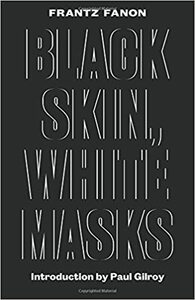Take a photo of a barcode or cover
"O my body, make of me always a man who questions!"
To an extent, a liberating and poignant experience.
To an extent, a liberating and poignant experience.
The best books are those which make you not only reevaluate your own views, but which also makes you reevaluate how views are created. A very insightful book written with a powerful energy. Describes how black Antilleans, when raised French and white, are forced to come to grips with their own consciousness when confronted by French racism. The proceeding neuroses which developed come from conflict in the self, moreover, the relationship to the body changes when one is forced to view it as an other.
There is an excellent explanation for how societies view black people as sexual animals, through a false collective cultural perspective.
I feel like the psychological aspects, based on Freud, were not as convincing, but that is a small criticism in groundbreaking book.
The continuation of existential thought.
Reminds me a lot of The Sympathizer by Viet Thanh Nguyen, and I'm sure that Fanon influenced him.
There is an excellent explanation for how societies view black people as sexual animals, through a false collective cultural perspective.
I feel like the psychological aspects, based on Freud, were not as convincing, but that is a small criticism in groundbreaking book.
The continuation of existential thought.
Reminds me a lot of The Sympathizer by Viet Thanh Nguyen, and I'm sure that Fanon influenced him.
Lewis Gordon says somewhere that Black Skin, White Masks is a blues texts. That is, it's like blues music: there is a kind of catharsis that yields sobriety and a confrontation with reality that was previously too much to bear. For example, see the conclusion of Fanon's phenomenological description of his lived experience as a black colonized subject: "Yet, with all my being, I refuse to accept this amputation. I feel my soul as vast as the world, truly a soul as deep as the deepest of rivers; my chest has the power to expand to infinity.” Fanon's will to affirm his life in face of life-negating colonialism is only possible by writing from "the zone of nonbeing" and by taking advantage of a "descent into a veritable hell,” as he writes in the book’s introduction. <3
I'm ambivalent about the psychoanalysis, but the mix of prose, poetry, and argumentation moved me. If my dad was a radical anti-racism activist, these are the things I image he'd tell me about myself and my colonized mind.
Very interesting, highly quotable, nonetheless feels like a very long read in spite of its shortness, be ready, it is an academic text.
I wouldn't recommend reading it in one go, it wouldn't be too palatable.
Also, not to do any anachronism but be aware that its a tad homophobic and mysoginistic.
I wouldn't recommend reading it in one go, it wouldn't be too palatable.
Also, not to do any anachronism but be aware that its a tad homophobic and mysoginistic.
challenging
dark
hopeful
informative
inspiring
tense
fast-paced
“In the world I am heading for, I am endlessly creating myself.
I show solidarity with humanity provided I can go one step further.”
#bookfeature 📖 Black Skin, White Masks by Frantz Fanon. This is an intriguing book that uncovers the detrimental effects of colonization, professing witness accounts of behaviours of the colonized subjects. Fanon offers a compelling argument on the psychological impacts that the colonized subjects suffer from, even till present day. Written in the context of France in the 1940s, it was first published in 1952 - hailed for its scientific analysis.
💭 “Understanding something new requires us to be inclined, to be prepared, and demands a new state of mind.”
I picked up this book after attending a talk by NUS prof, Dr Suriani, who unpacked and discussed the internalisation of a sense of inferiority in Malays. Upon reflection, I drew parallels to minority voices and lived experiences here in Singapore, always struggling and dealing in a conflicting reality. One where we continue to define and redefine our individuality and identity, in a majority Chinese society. I could relate to the valid points made about how the idea of “Malayness” could be easily misconstrued with negative, backward traits, thus justifying the need for Malays to be more like the Chinese (who are deemed to be superior and more successful). I know of Malay friends who proudly claim they do not want to date Malays. I know of Malay friends who refuse to speak Malay simply because. And I know of my own underlying biases that used to surface from time to time. This led me to realise the power of internalised racism, and how minorities do fall prey to it - compelling us to feel the need to acquire “appropriate” behaviours of a majority race - i.e. preferring to be like the Chinese.
Reading this book urged me to reflect and realise that leaders and role models are still largely Chinese male men - with a few minority representatives that we do celebrate and revere. The optics of race and race relations here in Singapore society remain prevalent in any discourse on societal issues.
While a few seem to argue and stand proud of our meritocratic system, an increasing number of us are realising the disparities and inequalities that seem to persist, if not grow.
I recall discussing with my students on microaggressions and the harmful effects we leave on others when we discriminate based on skin colour and race. When we make jokes that jab at another’s self-esteem. And when we choose not to see race, dismissing the lived realities of minority groups everywhere. I recall dealing with difficult views of individuals who continue to believe that there is an inherent inferiority in the minority races, and I remember reminding myself never to generalise based on baseless assumptions. Biases and prejudices are difficult to unlearn - we must do the work. A collective defensive othering is not the way to go.
This book remains a powerful force today on revolutionary struggle and racial difference in human history. With white supremacy and anti-blackness being witnessed all over the world today - including in Singapore - we cannot help but realise that the work for true justice and equality (as we pledge daily) is an ongoing process. We cannot misrecognize failures of individuals and end up collectivising it to the whole race.
This is a book I’d highly recommend with critical accompanying reads: ‘The Myth of the Lazy Native’ by Syed Hussein Alatas ‘The Singapore Dilemma’ by Lily Zubaidah Rahim
I show solidarity with humanity provided I can go one step further.”
#bookfeature 📖 Black Skin, White Masks by Frantz Fanon. This is an intriguing book that uncovers the detrimental effects of colonization, professing witness accounts of behaviours of the colonized subjects. Fanon offers a compelling argument on the psychological impacts that the colonized subjects suffer from, even till present day. Written in the context of France in the 1940s, it was first published in 1952 - hailed for its scientific analysis.
💭 “Understanding something new requires us to be inclined, to be prepared, and demands a new state of mind.”
I picked up this book after attending a talk by NUS prof, Dr Suriani, who unpacked and discussed the internalisation of a sense of inferiority in Malays. Upon reflection, I drew parallels to minority voices and lived experiences here in Singapore, always struggling and dealing in a conflicting reality. One where we continue to define and redefine our individuality and identity, in a majority Chinese society. I could relate to the valid points made about how the idea of “Malayness” could be easily misconstrued with negative, backward traits, thus justifying the need for Malays to be more like the Chinese (who are deemed to be superior and more successful). I know of Malay friends who proudly claim they do not want to date Malays. I know of Malay friends who refuse to speak Malay simply because. And I know of my own underlying biases that used to surface from time to time. This led me to realise the power of internalised racism, and how minorities do fall prey to it - compelling us to feel the need to acquire “appropriate” behaviours of a majority race - i.e. preferring to be like the Chinese.
Reading this book urged me to reflect and realise that leaders and role models are still largely Chinese male men - with a few minority representatives that we do celebrate and revere. The optics of race and race relations here in Singapore society remain prevalent in any discourse on societal issues.
While a few seem to argue and stand proud of our meritocratic system, an increasing number of us are realising the disparities and inequalities that seem to persist, if not grow.
I recall discussing with my students on microaggressions and the harmful effects we leave on others when we discriminate based on skin colour and race. When we make jokes that jab at another’s self-esteem. And when we choose not to see race, dismissing the lived realities of minority groups everywhere. I recall dealing with difficult views of individuals who continue to believe that there is an inherent inferiority in the minority races, and I remember reminding myself never to generalise based on baseless assumptions. Biases and prejudices are difficult to unlearn - we must do the work. A collective defensive othering is not the way to go.
This book remains a powerful force today on revolutionary struggle and racial difference in human history. With white supremacy and anti-blackness being witnessed all over the world today - including in Singapore - we cannot help but realise that the work for true justice and equality (as we pledge daily) is an ongoing process. We cannot misrecognize failures of individuals and end up collectivising it to the whole race.
This is a book I’d highly recommend with critical accompanying reads: ‘The Myth of the Lazy Native’ by Syed Hussein Alatas ‘The Singapore Dilemma’ by Lily Zubaidah Rahim
Only two words: Negrophobia and Negrophilia.
Fanon explained how the fetishism of Black men is still current today, and how the dynamic in some of those couples with white men/women, could turn to a dark side.
Reading testimonies on young Black men, trying to adapt themselves in a post-colonial society which is both unapologetic about Slavery and scared of those descendants, is painful. They had to erase a part of themselves and tried to fit a mold that was never going to accept them. Quite a depressing thought.
I wish he would have written a bit more about the relationships between a Black woman and a White man, it felt superficial, compared to the part with Black men and White women.
Fanon explained how the fetishism of Black men is still current today, and how the dynamic in some of those couples with white men/women, could turn to a dark side.
Reading testimonies on young Black men, trying to adapt themselves in a post-colonial society which is both unapologetic about Slavery and scared of those descendants, is painful. They had to erase a part of themselves and tried to fit a mold that was never going to accept them. Quite a depressing thought.
I wish he would have written a bit more about the relationships between a Black woman and a White man, it felt superficial, compared to the part with Black men and White women.
Read this for Intro to Comparative Ethnic Studies. Compared to a lot of the other books we read, I found it difficult to pull out theoretical/analytical tools from the text and apply them elsewhere, which was frustrating. Also, the sexism and heteronormativity, as well as the overpathologization of people of color reacting against racism, really rubbed me the wrong way. Still, I recognize its status as a classic in the field.
challenging
emotional
reflective
medium-paced
challenging
emotional
informative
medium-paced






